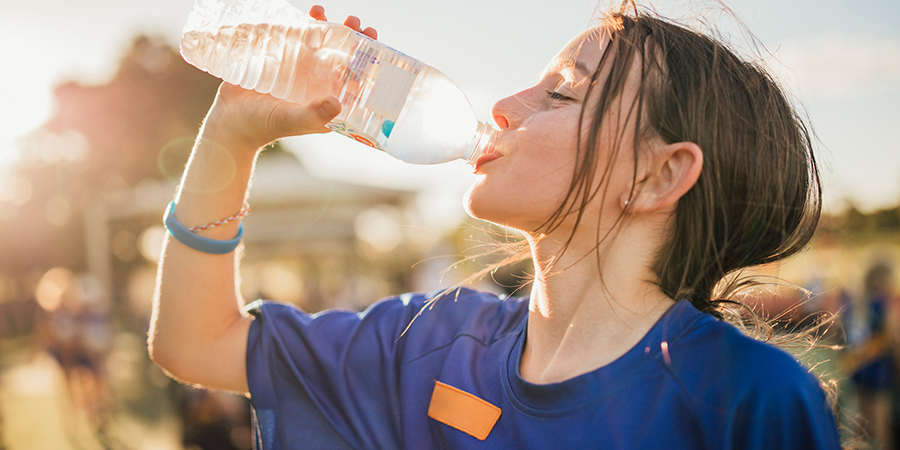August Summer Heat Concerns: What You Need to Know
August 19, 2019
August is known to be one of the hottest months in Maryland. Its high temperatures and humidity can be detrimental to everyone, particularly children and seniors.
With school starting soon and young athletes getting ready for another year, you probably have some concerns about how to keep them safe in the heat—no need to worry. Dr. Kevin Ferentz, Chairman of Family Medicine at Greater Baltimore Medical Center (GBMC), has the answers to your questions.
What kind of sunscreen should you use?
When it comes to sunscreen, you want to make sure it has an SPF of 30. An SPF of 30 helps decrease the amount of time it takes to get a sunburn. For instance, say it takes about 15 minutes to get burned. With SPF 30, it will take 30 extra minutes.
There's no such thing as "water-proof" sunscreen, according to Dr. Ferentz. If you get into the pool or beach water, the sunscreen will come off. If you're planning to spend long periods outside, remember to re-apply sunscreen every two hours to ensure your skin is protected.
Dr. Ferentz also recommends using lotion sunscreen over sprays because you can't massage sprays into your skin.
Did you know that you can get skin cancer on your scalp too? Your scalp is one of the first parts of your skin to be exposed to the sun. Wearing a hat reduces the risks of sunburn and skin cancer.
What you need to know about sunburn
There are two degrees of sunburn to look for:
First-degree sunburns are the most common. The skin is not blistered and can easily be treated at home. A cold compress and one percent cortisone topical cream along with numbing pain medication, such as Tylenol should help with the healing process. The first-degree sunburn should go away within a week.
Second-degree sunburns usually contain blisters. If you do have blisters, don't pop them. Popping them will expose what's inside the blister to bacteria.
If the sunburn gets worse, if a large area of your body is burned, or if you lose fluids and contract an infection, see a doctor right away.
Make sure to take breaks in the shade when you're out in the sun for hours. If you start to feel faint or tired, get inside where it's cool. Applying ice to the neck, armpits, and groin area will cool you down faster. These areas are where the largest blood vessels reside.
Remember, a history of three sunburns can raise the risks of skin cancer.
Stay hydrated
Everyone has heard that you should drink eight glasses of water a day. But this is not scientifically correct, according to Dr. Ferentz. The amount of water you drink depends on how much you sweat, your environment, your daily activities, and how hot it is. In actuality, drink water when you're thirsty. If you're out in the sun, drink more.
It's essential to keep children hydrated when they're out in this treacherous heat. Juice contains too many calories and sugar. Parents can offer fruit pops as an alternative for kids who aren't fond of water.
What about Gatorade? It seems like a good substitute for water. It tastes good, and it's filled with electrolytes. Gatorade and other sports drinks like Powerade and All Sport are also high in sugar and calories. They won't provide the hydration your child needs when they're out moving around in the heat. Encourage your child to drink water, especially student-athletes.
Don't forget your fruits and veggies. Fruits and vegetables are 95 percent water. So, make sure your children are eating them daily as it will help to keep them hydrated.
Parents, you may have heard your child's coach tell them to hydrate their bodies a day before the game. While this is true, young athletes should make it a daily task to stay hydrated. Drinking tons of water the day before will not help because they will release it when they go to the bathroom the next morning. They will also sweat it out during practice. You must always make up for what you lose.
Be cautious of heatstroke
Heatstroke occurs when the core temperature gets so high, about 103 or 104, that the nervous system begins to malfunction. This can cause deliriousness and lead to other serious health issues. If your child or a loved one seems out of it, get to the ER right away.
The doctors in the ER can give them an ice bath to help cool everything down.
Tick bites and Lyme disease
Several ticks carry Lyme disease. They are tiny like a grain of rice. You can contract Lyme disease when you have a tick that's been on you for about a day or two, and the tick has become enlarged.
If a tick bites you, a rash will develop in the same area as the bite, and then It will then begin to expand out. If you treat the bite shortly after, there's no need to worry. About 80 percent experience a rash, which appears within a few days to a month after the bite. Other symptoms include fatigue, a headache, and feeling yucky. If you notice any of these, see your doctor. They can give you an antibiotic to help cure Lyme Disease.
Tick bites occur mostly in the woods, so if you plan to be around trees, make sure to use tick repellant. If you see one on you, don't panic and don't swipe it. More than likely, it's latched onto your skin. Instead, cover the tick and pull it straight up.
You may have heard of something called Chronic Lyme Disease, but according to Dr. Ferentz, there's no evidence that it exists.






